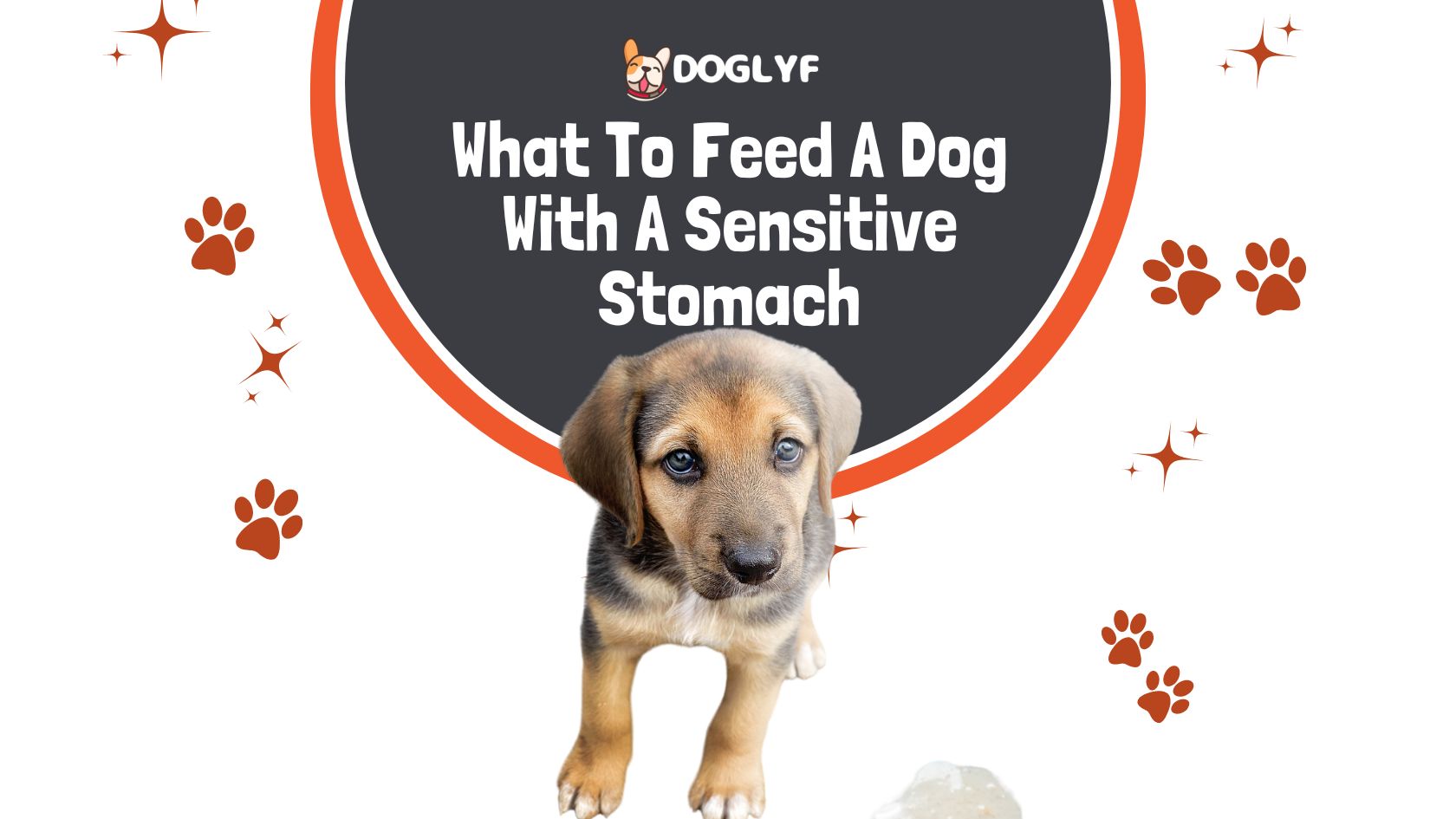This post may contain affiliate links. For more information about my affiliate disclosure, please click here
Do you have a dog with a sensitive stomach? Are you looking for ways to make sure they’re getting the nutrition they need while also avoiding upset tummies? You’ve come to the right place!
Feeding your pup can be tricky, and you must know what foods are safe for them so that their health isn’t compromised.
This article will discuss what to feed a dog with a sensitive stomach—from high-quality proteins to carbohydrates, fats, and fruits & veggies.
We’ll look at which types of food are best avoided and why. Ready to get started? Let’s dive in!
- On-Demand Videos
- 24/7 Support
- Improves Dog’s Mental Health
- Improves Dog’s Mental Illness
- Dog Training Tricks and Games to Improve Dog’s Response
- In-depth Video Training
- Available on All Devices
- Includes One Time Fee
A Sensitive Stomach In Dogs

Having a dog with a sensitive stomach can be frustrating. A dog digestive issue can present in different forms, from vomiting after eating to general abdominal discomfort and stool issues.
Knowing the signs of your pup having a sensitive stomach is important for helping them live their best life.
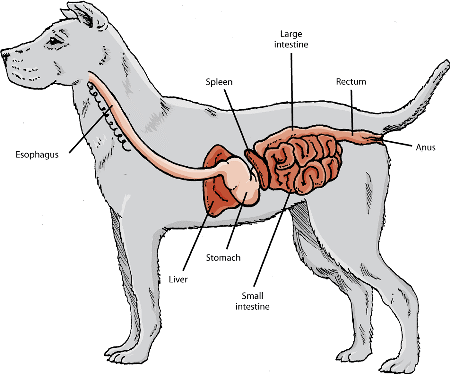
A dog-sensitive stomach refers to gastrointestinal sensitivity that causes distress or upset in the dog’s digestive system. This could include ANYTHING from food intolerance to inflammation in the gut lining, bacterial imbalance, or even an infection.
Your pet may show generalized symptoms like diarrhoea, constipation, excess gas, bloating, and/or vomiting – all of which might indicate there’s something wrong inside their tummy. Additionally, dogs experiencing digestive distress may lose appetite too!
If you think your pup has a sensitive stomach, it’s essential to seek advice from your veterinarian right away since they are trained professionals who know how to handle these types of situations appropriately.
Also Read, Dog Dental Care 101 – How Many Teeth Do Dogs Have?
With a proper diagnosis and treatment plan set up by the vet, you will be able to provide your furry friend with relief and help them feel better soon! Now let’s take a look at what potential causes may lead to this condition in our beloved companions.
Causes Of Digestive Issues In Dogs

It’s like searching for a needle in a haystack – trying to figure out what causes digestive issues in dogs. There are many underlying conditions, improper nutrition, dietary intolerances and food allergies that can affect digestion.
Additionally, bacterial infections may occur due to environmental exposure or an imbalance of the gut microbiome.
- Improper nutrition
- Dietary intolerance
- Food allergies
These three factors are often at the root of digestive problems in our furry friends. In addition to these common culprits, poor-quality pet foods with added fillers and preservatives can also be hard on their stomachs.
Can Dogs Eat Bananas? Is it yay or nay for dogs?
If your pup is experiencing any gastrointestinal distress, it’s best to consult with your vet as there may be other medical issues causing discomfort.
With a few simple changes, you’ll soon have them feeling better than ever! Transitioning into the next section, let’s take a look at some symptoms of sensitive stomachs in dogs.
Symptoms Of A Sensitive Stomach In Dogs
It’s important to recognize the signs of a sensitive stomach in your dog. There are several common symptoms that you can watch for, such as:
| Symptoms | Common Signs | Emotional Impact |
|---|---|---|
| Vomiting | Throwing up food or bile | Worried and stressed out due to lack of energy |
| Diarrhea | Loose stools with watery consistency | Uncomfortable and anxious about not being able to control bodily functions |
| Constipation | Hard stools; straining during elimination process | Frustrated if unable to pass stool normally |
| Appetite Loss | Refusing meals or treats; decreased interest in food | Fearful of eating again due to discomfort experienced earlier |
| Stomach Pain | Glancing at their belly while wincing; pacing around restlessly without settling down comfortably | Restless, irritable, and confused due to inability to understand why they feel pain when nothing was done wrong |
| Gas & Bloating | Abdominal swelling accompanied by passing gas frequently throughout the day Lonely because it’s difficult for them to find relief from pressure caused by bloating. |
If you notice any of these symptoms, then it may be time for further diagnostics on your pet’s digestive system.
Diagnosing The Problem
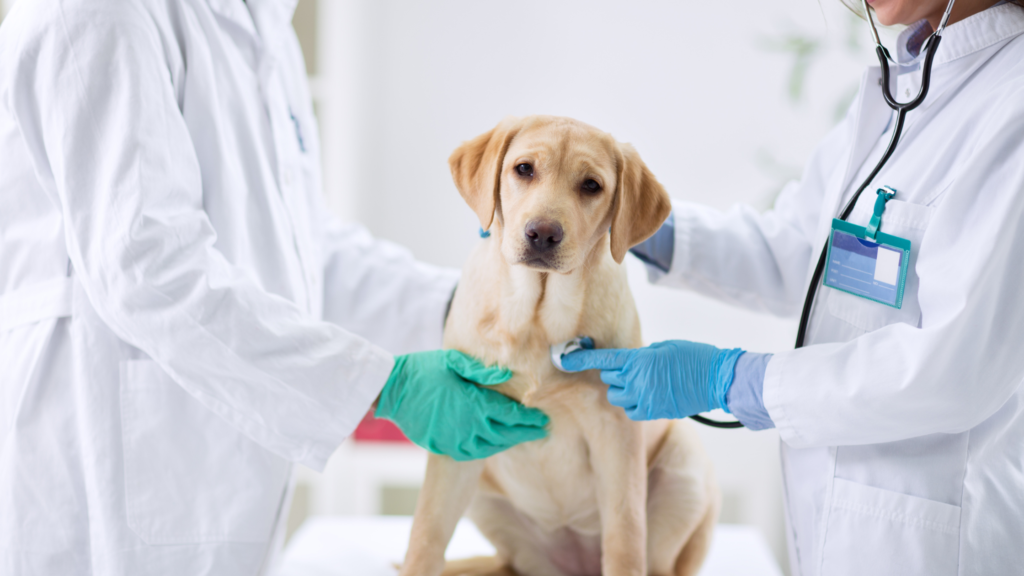
Trying to figure out what’s wrong with your pup can feel like an overwhelming, never-ending journey.
It can seem like you’ve been wandering in the dark forever, trying desperately to diagnose your sensitive stomach! But don’t worry; there are steps you can take to identify digestive issues and help get them back on track.
- First and foremost, pet owners need to observe their dog’s behaviour after meals. If they’re experiencing persistent vomiting or diarrhea, then that could be a sign of a larger issue at play.
- Additionally, changes in appetite or signs of discomfort should always prompt further investigation into the potential causes of their stomach sensitivity diagnosis.
- Next, pet owners must look for possible allergies when diagnosing digestive issues. Dogs may show signs such as skin irritation or excessive scratching which might suggest an allergy is present – something not uncommon among dogs with digestive problems.
Finally, speaking with experts like veterinarians or nutritionists can give us invaluable insight into how we can properly detect and diagnose any underlying health concerns our furry friends may have.
Also read Dog’s Pregnancy 101 For Owners! How Long Are Dogs Pregnant?
It’s essential that this process is taken seriously so that we can assess the effects on our pup’s health and well-being before making any drastic dietary decisions.
Effects On Dog’S Health And Well-Being
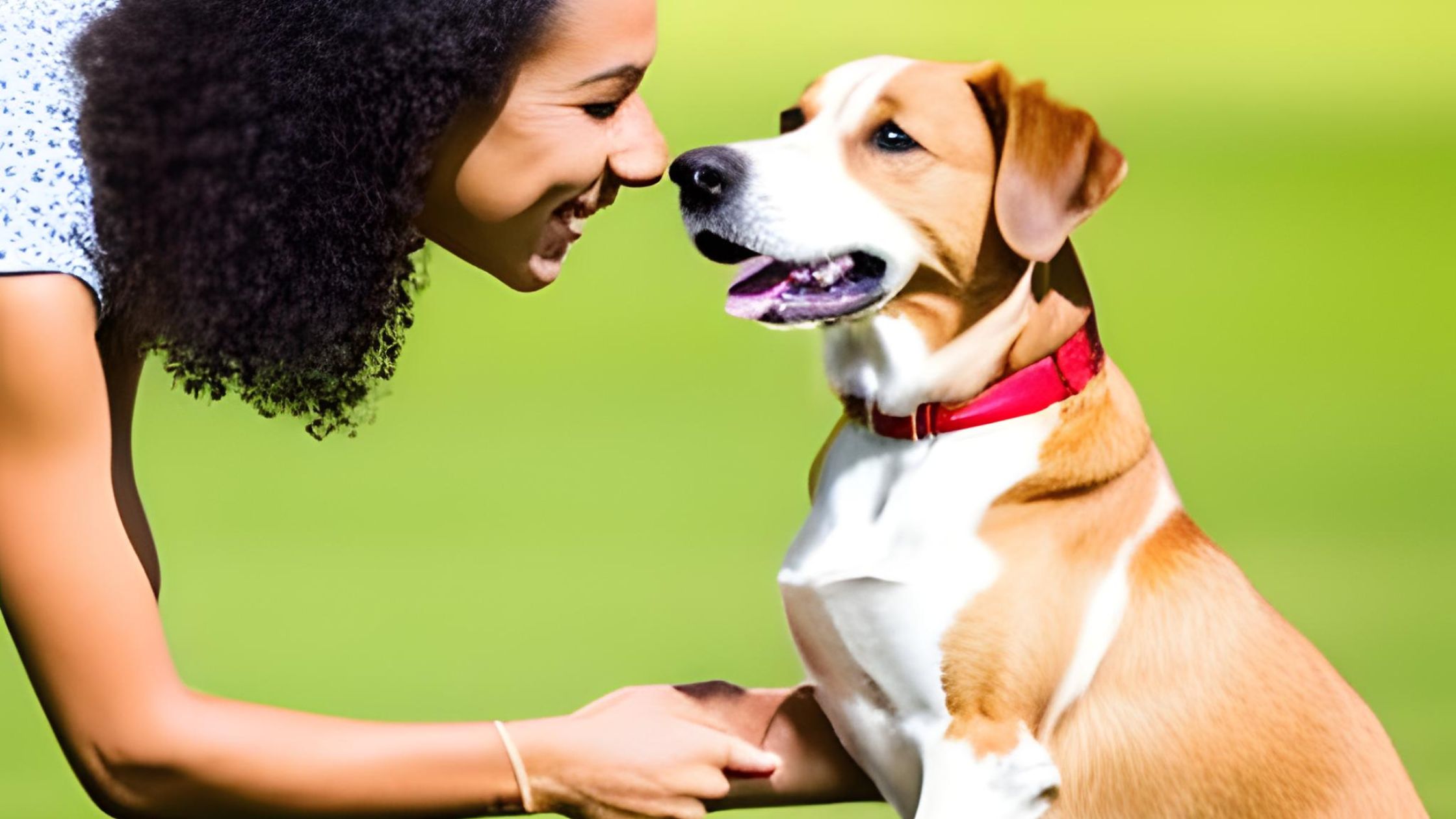
The health effects of having a sensitive stomach can profoundly impact your dog’s life. The digestive discomfort, gastrointestinal distress and poor absorption of nutrients from food can all take their toll on your pup.
Not only that, but the lack of energy and reduced activity level due to feeling unwell may also be contributing factors to the further strain on your pet’s well-being. Here are 3 key ways in which feeding an inappropriate diet to dogs with sensitive stomachs can affect their overall health:
Reduced appetite – Certain foods may cause nausea or abdominal pain, resulting in decreased interest in eating altogether
Digestive issues – Diarrhea, constipation, flatulence and vomiting may occur if the wrong food is fed
Nutritional deficiencies – Important vitamins and minerals not being absorbed properly can lead to malnutrition over time
Therefore it’s important to understand how best to support your canine companion by providing them with nutrient-dense meals suited specifically to their needs. This will ensure optimal health and happiness for both you and your pet!
Recommended Diet For Dogs With Sensitive Stomachs
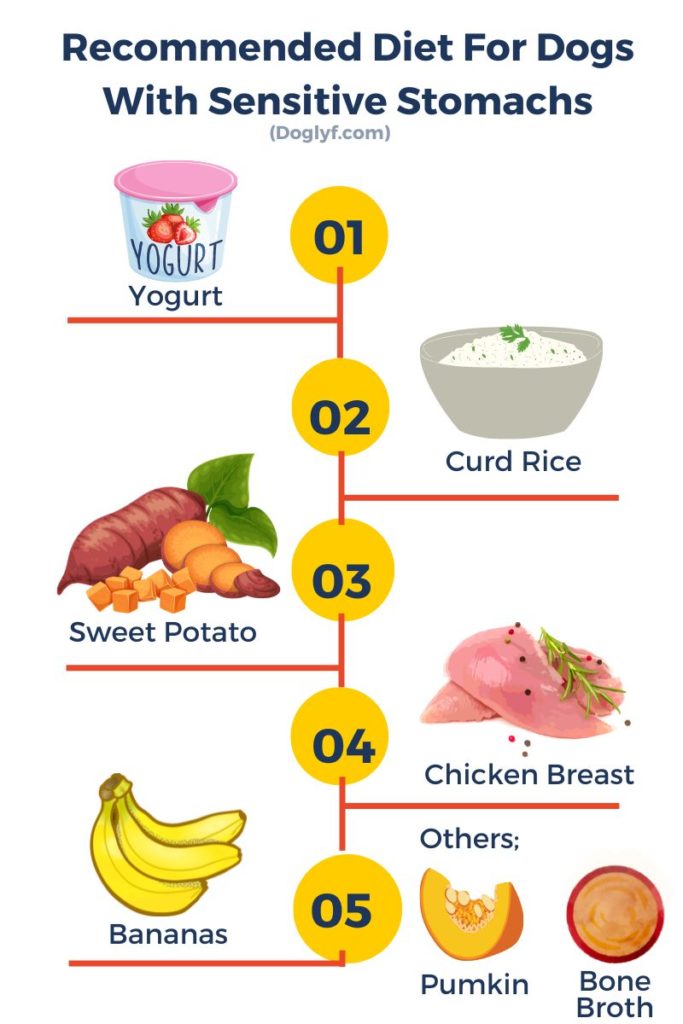
The options can be overwhelming when it comes to feeding a dog with a sensitive stomach. Thankfully, there are some general tips that can help owners tailor their pup’s diet to fit their needs.
Commercial diets designed for dogs with sensitive stomachs are an excellent option and often incorporate limited ingredients or novel proteins like lamb, duck, venison and bison as well as pre-and probiotics which aid in digestion.
These specialized diets may include additives such as supplements that offer additional digestive support. It is important to consult your veterinarian before introducing new treats or supplements into your pet’s diet if they have dietary sensitivities.
- Feeding smaller meals more frequently throughout the day rather than one large meal helps prevent excessive gastric acid secretion and reduces the risk of vomiting and diarrhea associated with food allergens or intolerances too. As always, fresh water should be available at all times when feeding your pooch!
Homemade diets can also provide tailored nutrition for those pups who suffer from certain allergies or issues processing specific ingredients but require careful consideration given potential nutrient deficiencies; consulting your vet prior to making any changes is essential.
Homemade Diet Options For Dogs With Sensitive Stomachs
If your pup has a sensitive stomach, it’s important to consider what you feed them. Fortunately, there are plenty of homemade diet options that can be tailored to suit their needs. With the right ingredients and recipes, you can ensure your pup is getting all the nutrition they need while avoiding any possible digestion problems or stomach issues.
When looking for recipes dogs with sensitive stomachs should avoid foods high in fat or fiber; instead opting for lean proteins like chicken, turkey, fish and eggs as well as cooked sweet potatoes, rice and oats.
- You may also want to add probiotics like yogurt or kefir to help promote healthy gut bacteria.
- Additionally adding low-fat cottage cheese and boiled vegetables such as carrots, peas and green beans will provide essential vitamins and minerals without risking further digestive upset.
Finding the best dog food ingredients for your pet may take some trial and error but by doing so you can create meals specifically suited to their individual needs.
In addition to providing balanced nutrition this ensures that mealtime remains enjoyable for both you and your dog!
By taking into consideration the dietary requirements of our four legged friends we can make sure they stay happy and healthy no matter what kind of sensitivity they have. From picking out the perfect recipe to ensuring each ingredient is suitable – cooking up delicious dishes at home provides us an opportunity to give our furry companions special care every day.
Feeding Tips For Dogs With Sensitive Stomachs
Now that we have an understanding of the recommended commercial diets for dogs with sensitive stomachs, let’s look at some feeding tips to help your pup feel better. Taking care of a dog with digestive issues can be difficult and stressful, but there are ways you can support their needs.
| Tips | Dog Food Selection | Feeding Habits |
|---|---|---|
| Talk To Your Vet | Choose food specifically designed for sensitive stomachs. Avoid foods that contain artificial ingredients or preservatives. Choose high-quality proteins such as fish, chicken, lamb, etc. | Offer small meals throughout the day instead of one large meal. Give them enough time in between feedings to digest properly. Monitor how much they eat and adjust portions accordingly. |
| Stick To A Bland Diet | Go for grain-free options like rice, oatmeal or potatoes if grains bother your pup’s tummy. Add nutritionally balanced veggies like carrots, squash and sweet potatoes every now and then but don’t overdo it because too many fresh vegetables can cause loose stools in some cases. | Limit treats since too much variety might confuse their system and trigger allergies or intolerances. Try giving bland snacks such as boiled chicken breast or plain yogurt for extra hydration during hot days without upsetting their digestion system further. If needed supplement with probiotics to restore gut health balance quickly |
| Avoid Common Allergens & Intolerances | Steer clear from common allergens such as beef, dairy products and wheat gluten which may worsen existing digestive problems even more so make sure these ingredients aren’t present on the label when possible. Other potential culprits are egg whites, corn syrup solids and soybean oil – all should be avoided whenever possible according to veterinary advice . | Let your pup rest after eating by providing a quiet environment free from any distractions and noise levels that could potentially upset his/her delicate digestive tract while trying to process nutrients effectively . Also keep track of any symptoms he/she is displaying (excessive scratching, vomiting) that could alert you about certain dietary reactions occurring post-mealtime |
Taking this into consideration, following these simple guidelines will help ensure your pup feels comfortable again! With proper monitoring of what goes into their bowl each day combined with regular vet visits, you’ll get closer to finding the perfect diet solution for your furry friend’s unique nutritional needs!
Supplements For Dogs With Sensitive Stomachs
Picture your beloved pup, contentedly snuggled up on the couch beside you. You want to give them only the best care possible, and that includes providing supplements for dogs with sensitive stomachs.
There are many benefits to such supplementation, ranging from improved digestion to overall better health for your furry friend.
Digestive supplements can be especially helpful when it comes to soothing a dog’s sensitive stomach. These products contain natural ingredients like probiotics and prebiotics which help restore balance in their digestive system.
They also provide essential nutrients that may be lacking due to sensitivities or allergies. As an added bonus, these supplements often taste great too—making sure your pup is getting all of the nutrition they need without any unpleasantness!
When selecting supplements for your pooch, make sure you read labels carefully and talk to your vet about any potential side effects or interactions with existing medications if necessary.
Good quality supplements should always come recommended by vets so take their advice seriously before deciding what’s best for your pup’s needs. With just a little bit of research and careful consideration, you can find the perfect supplement for keeping your precious pet healthy and happy.
Treats And Chews For Dogs With Sensitive Stomachs
When it comes to feeding your pup with a sensitive stomach, treats and chews should be chosen with great care.
Dog treats that are specifically designed for sensitive stomachs can help reduce digestive issues while still giving them something special as a reward or just an occasional snack.
The best way to find the right treat is by looking at ingredients carefully and avoiding those with artificial flavors, colors, preservatives and fillers. You’ll also want to avoid foods with high-fat content like bacon and cheese which can further irritate their delicate tummies.
Chews are another great option for dogs with sensitive stomachs. Look for natural options such as rawhide free bones made from real meat and vegetables instead of processed grains or starches – these will provide essential nutrients without irritating the intestines.
Whenever possible, select chews that have been sourced in the USA; this ensures good quality control standards so you know exactly what your pup is consuming. Plus, organic chew alternatives may even offer additional health benefits for our furry friends!
If you’re considering buying pre-made treats or chews from a store, make sure they have certifications from organizations like the National Animal Supplement Council (NASC).
This means they meet strict guidelines regarding safety, purity and efficacy which helps ensure your pup gets only the best nutrition possible. With some careful research and comparison shopping you’ll be able to find plenty of tasty options that won’t upset your pet’s sensitive stomach!
Possible Allergens To Avoid Feeding Your Dog
It’s important to make sure that your pup is getting the best nutrition possible and avoiding any allergens or sensitivities. To ensure a healthy diet for a dog with a sensitive stomach, it’s beneficial to choose foods that are grain-free, dairy-free, soy-free, corn-free, egg-free, beef-free and pork-free.
Additionally, look out for artificial colourings and flavourings in ingredient lists as they can trigger digestive issues in some dogs. It may take some trial and error at first to find the right combination of ingredients but be patient;
you’ll soon discover what works best for your pet. With so many options available these days it shouldn’t be too hard! Now that we have discussed which food items should be avoided when feeding a dog with a sensitive stomach, let’s move on to when it might be time to see the vet…
When To Take Your Dog To The Vet
When it comes to managing a dog’s sensitive stomach, knowing when to take them to the vet is just as important as being aware of potential allergens and dietary restrictions.
If your pup has had regular episodes of vomiting or diarrhea for more than 24 hours, this could be an indication that something serious might be going on with their digestive system.
Additionally, if they are experiencing loss of appetite, lethargy, dehydration or constipation – these may all be symptoms of a deeper issue and warrant a visit to the veterinarian.
It is always best practice to consult a professional before making any changes in your pet’s diet or lifestyle habits. A vet can provide valuable insight into what kind of foods should be avoided for dogs with sensitive stomachs and will also help diagnose any underlying health issues.
After examining your animal, the vet may suggest specific feeding advice such as adding probiotics or other supplements to their daily meals. These measures can help improve gut health and reduce inflammation in the gastrointestinal tract which is key in helping manage digestive issues.
Once you have received specialized guidance from a veterinary professional regarding how to feed your dog with a sensitive stomach, it’s time to look into long-term care and management strategies.
Your vet will likely recommend certain exercises, activities or medications that can help ease your pup’s discomfort over time.
Furthermore, keeping up with regular checkups at least once per year ensures that any further problems identified early on can get taken care of quickly so that your fur baby stays happy and healthy!
Long-Term Care And Management Strategies
It’s a beautiful day and you’re taking your pup for their first walk of the morning. You can almost feel the sun on your skin as they trot along, tail wagging with joy. But when it comes to caring for a dog with a sensitive stomach, long-term care and management strategies are essential.
To keep your pup safe in the long run, start by providing them with high quality food that is easy on their digestion. Look for foods that contain limited ingredients, preferably those that don’t include artificial flavors or preservatives.
Additionally, make sure to feed them at consistent times each day so their system can get used to regular meal schedules.
Your veterinarian should also be able to provide helpful advice on other ways to ensure your pup’s digestive health remains balanced over time. This includes any supplements or medications they may need if symptoms persist despite dietary changes.
Taking these extra steps will help give you peace of mind knowing that you’re doing everything possible to keep your pup healthy and happy well into the future. Now let’s look at some questions you should ask your vet about managing a sensitive stomach in dogs.
Questions To Ask Your Veterinarian
Now that you’ve read up on long-term care and management strategies for a dog with a sensitive stomach, it’s important to take the next step and talk to your veterinarian.
They can help guide you in making decisions specific to your pet’s health needs. Here are some questions you should ask your vet about caring for a dog with a sensitive stomach:
- First, ask what could be causing the sensitivity in the first place. Your vet will likely have an opinion as to whether it’s caused by allergies or dietary issues. Ask if there are any allergens that could be irritating your pup’s digestive system, such as certain foods or environmental factors like pollen.
- Then inquire about diet changes that may be necessary – do they suggest switching over to a hypoallergenic formula? Are there supplements you can add?
- Next, find out how often and when you should feed your pup throughout the day so he doesn’t become too full or hungry between meals.
Your vet might also advise on portion control depending on your circumstances – maybe smaller meals more frequently is best.
Also, don’t forget to ask any questions about potential medication options that might help ease digestion discomfort.
Finally, make sure you understand all of the instructions regarding diet and lifestyle adjustments fully before leaving the office.
It’s important to ensure both parties agree on any new routine or plan so that everyone involved understands their role in keeping your dog’s health at its peak!
Frequently Asked Questions
How Can I Tell If My Dog’s Digestive Issues Are Due To A Sensitive Stomach?
Figuring out if your dog has a sensitive stomach can be tricky. But, understanding the signs and symptoms of this issue can help you differentiate it from other digestive issues. In this article, I will provide an overview of what to look for and how to better care for your pup if they do have a sensitive stomach.
Several signs may indicate that your pooch’s digestive problems could be due to a sensitive stomach. These include vomiting or diarrhea after eating certain foods, chronic bloating, flatulence, and general discomfort after meals. Additionally, their stools may contain mucous or blood streaks as well as having a softer consistency than usual.
If any of these symptoms sound familiar you should take some steps to alleviate their discomfort:
- Switch up food brands – Try different proteins and ingredients in order to find something more suitable
- Feed them smaller meals throughout the day – This helps reduce digestion overload
- Avoid processed treats – Stick with homemade snacks like cooked sweet potato cubes or boiled chicken pieces
- Add probiotics into their diet – Probiotics are beneficial bacteria found in yogurt that aid digestion
- Introduce new foods slowly – Start by mixing small amounts of novel items into their regular food over time
Caring for a canine with a sensitive stomach requires patience but is incredibly rewarding when done properly. Taking the time to monitor their behavior around food, providing quality nutrition tailored to their needs and being knowledgeable about potential triggers can make all the difference in ensuring optimal health for your furry friend!
What Should I Do If My Dog Has An Allergic Reaction To Food?
If you suspect that your dog has an allergic reaction to food, it’s important to take action. Understanding the signs of a food allergy in dogs, and knowing how to properly diagnose and treat them can help you keep your pup healthy and safe. Here are some key points when dealing with a dog food allergy:
- Identifying symptoms such as skin rashes or vomiting
- Knowing what type of tests may be necessary for diagnosis
- Learning about potential treatments like ointments or dietary changes
- Investigating ways to prevent future reactions from occurring
- Being aware of common allergens found in commercial pet foods
It’s also important to understand that while allergies can be frustrating and uncomfortable for both you and your beloved canine companion, they don’t have to put an end to their good times. With the right treatment plan, diet adjustments, preventive measures, and lots of love, you’ll soon have your furry friend back on track!
The first step is recognizing any possible food allergy symptoms in your pooch. Look out for things like excessive scratching or licking of the fur, redness or inflammation around the muzzle area, diarrhea or other gastrointestinal issues, coughing or wheezing fits after eating certain meals, hives or swelling on the surface of their body—all these could indicate an allergic response.
If left untreated this can lead to more severe health problems such as malnutrition from not being able to digest particular nutrients effectively.
Once you’ve identified any warning signs associated with a food allergy in your pup then it’s time for further testing by either conducting at-home experiments (such as switching up their diets) or consulting with a veterinarian who specializes in allergies.
The vet will likely suggest doing a blood test known as ELISA which checks antibody levels related to specific allergens present within the animal’s system. Additionally if needed they might refer you towards an elimination diet where they eliminate all potential triggers one at a time until they discover which ingredient/food group is causing the problem.
There are also options available now such as special hypoallergenic formulas designed specifically for pets prone to sensitivities so it may be worth trying those too!
Finally once you’ve determined which ingredients cause adverse reactions in your doggo then there are various methods for managing these allergies including changing up their regular diet accordingly (eliminating trigger items), using topical medications such as creams/ointments prescribed by vets, giving supplements containing omega fatty acids etc., taking extra precautionary steps like brushing them down before outdoor activities – these can all help reduce flare ups and make sure that Fido stays happy & healthy!
How Often Should I Feed My Dog With A Sensitive Stomach?
I know it can be difficult to figure out how often you should feed your dog with a sensitive stomach. It’s important to find the right balance between feeding them enough food while not over-feeding or causing them any discomfort.
The good news is that there are some guidelines and tips that can help you create an effective feeding schedule for your pup.
In order to create a successful dog eating schedule for a pup with a sensitive stomach, it’s best to start by determining the ideal number of feedings per day based on their size and age.
Generally speaking, smaller dogs will need two or three small meals in one day, while larger breeds may only require one large meal. When creating a feeding regimen for a pup with a sensitive stomach, avoid giving them too much food at once as this could cause digestive problems.
Additionally, make sure you’re providing them with fresh water throughout the day so they stay hydrated.
When planning out your pooch’s food frequency for their sensitive stomach needs, consider spreading out their meals evenly throughout the day instead of having just one big meal in the evening.
This way, you’ll ensure they’re getting all of their nutrients without feeling bloated or uncomfortable after eating. Also keep in mind that certain times of day might work better than others when it comes to finding the best feeding times for your pup’s specific condition – consult with your vet if needed!
By following these tips and being mindful of what works well for your pet’s unique situation, you can come up with an appropriate feeding guide and routine tailored specifically for your four-legged friend’s needs and comfort level.
Creating an effective feeding regimen doesn’t have to be complicated or stressful; just remember to take into account factors like their age, size, dietary requirements and sensitivity levels when coming up with the perfect plan that meets both yours and your pup’s expectations!
Are There Any Supplements That Can Help A Dog With A Sensitive Stomach?
I’m sure many dog owners have experienced their furry friend having a sensitive stomach and struggling with digestive issues or food allergies.
It can be overwhelming trying to figure out the best thing to do for your pup and how you can help them feel better.
The good news is that there are some supplements available that may help with these types of health concerns in dogs.
When it comes to figuring out what kind of supplement would work best for your pup, it’s important to consider both the type of diet they’re on (commercial or homemade) as well as any existing medical conditions that could affect absorption rates.
Here are some key points to take into account when considering supplements for dogs with sensitive stomachs:
- Look for natural ingredients like probiotics, ginger, turmeric, and aloe vera which can all aid digestion and reduce inflammation
- Check if the supplement contains prebiotics, which feed beneficial bacteria already present in the gut while also helping balance pH levels
- Make sure it doesn’t contain artificial colors or flavors as these could exacerbate problems like diarrhea or vomiting
- Ask your vet about specific vitamins and minerals they recommend adding to your pet’s diet since deficiencies can contribute to digestive troubles
It’s also important to remember that feeding your dog a balanced commercial diet is still essential even when supplemented.
Sticking to a consistent feeding schedule will allow you to monitor changes in behavior or appetite over time so you can adjust accordingly if needed. Taking proactive steps towards maintaining optimal health for our furry friends not only helps them stay healthy but keeps us informed as responsible pet parents too!
What Is The Best Commercial Diet For A Dog With A Sensitive Stomach?
When it comes to finding the best commercial diet for a dog with a sensitive stomach, there are several factors that need to be taken into account.
Firstly, you should understand your pet’s individual needs and any underlying digestive issues they may have.
Additionally, you need to consider their food allergies, feeding schedule, and whether or not supplements might help them manage their stomach issues more effectively.
To better understand what type of diet is most beneficial for dogs with sensitive stomachs:
- Start by looking at ingredient lists on commercial diets—avoiding foods that could cause an allergic reaction or exacerbate existing digestive problems.
- Speak to your veterinarian about potential dietary changes or supplements that can help address your pup’s specific health concerns.
- Be mindful of portion sizes when introducing new types of food as well as scheduling meals throughout the day.
Making sure our four-legged friends get the proper nutrition can be tricky but it doesn’t have to be overwhelming! With some research and consulting with your vet, you can find the right diet plan tailored specifically for your pup so they can enjoy life without having to worry about dealing with uncomfortable stomach issues.
Conclusion
It’s important to remember that every pup is different when it comes to digestive issues and a sensitive stomach. As a pet parent, you play an integral role in making sure your furry friend has the best nutrition possible for their individual needs. The most effective way of doing this is by determining what works best for them through trial and error, while also keeping an eye out for any potential allergic reactions or changes in behavior.
By taking the time to understand how to identify the signs of a sensitive stomach, as well as researching the right commercial diet and supplements options, you can provide your pup with a nutritious meal plan tailored just for them. It may take some patience along the way but providing your dog with the optimal fuel they need will be worth all of your hard work!
At the end of the day, ensuring our canine companions have proper food intake is key to helping them maintain good health and live long happy lives. With mindful feeding practices, coupled with love and care, you can give your pup everything they need to lead a healthy life even if they struggle from digestion woes stemming from a sensitive stomach.
